Dr Huseyin Dogan and Dr Paul Whittington have organised an Assistive Technology Symposium on Monday 24th June 2019 in Share Lecture Theatre, Fusion Building, Talbot Campus, Bournemouth University, 09:00 – 17:00.
Category / BU2025
Sustainability changes everything
Sustainability as ‘an outcome of conscious thinking’ was discussed at the Faculty of Management’s ‘Sustainability Symposium’ recently. The event was organised by Dr Karen Thompson and Professor Janet Dickinson in collaboration with the Association of Sustainability Practitioners and we began exploring ideas for new research on sustainability.
Changing economies across the globe to low or no carbon will require new understandings of the relationships between profit, people and the planet. The new understandings are needed to inform development of new models and ways of doing business that reflect the complexities of social practices. Three characteristics for research on sustainability issues were identified during the event:
- Incorporate partnerships building with practitioners and stakeholders
- Cross-disciplinary thinking that seeks to understand the complexity of social practices
- Fundamental re-thinking of existing models and ways of doing business.
New approaches to research will be required to address the challenges that face society today and will need to incorporate partnership building. Derek Robbins, Faculty of Management, is already doing this in his research with bus companies on developing smart apps. Dr Karen Thompson and Dr Nigel Williams shared their example of using social learning to collaborate with practitioners to develop the new concept of Responsible Project Management.
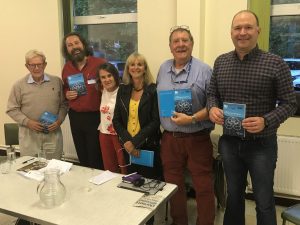
Their work has recently been shared with local councillors and they are exploring the possibilities for using a framework based on the UN’s 17 Sustainable Development Goals to promote better decision-making.
Research will also need to be cross-disciplinary. New models of business that link social practices with the possibilities arising from technological innovation, such as driverless electric cars, are required. One participant commented:
“this is a really important topic and it was useful to have people here from multiple disciplines because they have different views and are prepared to challenge. Personally I found I learnt a lot from the other speakers even though I’ve been working in this area for quite some time, so thank you very much.” (EC)
Research that seeks incremental improvement is unlikely to deliver enough change quickly enough. Re-thinking existing economic and business models from the bottom-up is required, and new models must balance the need for environmental restoration, reducing conflict between communities as well as being economically viable.
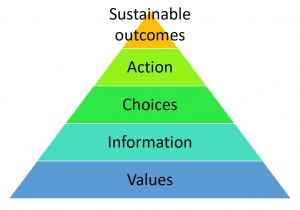
As well as the dependencies between economy, people and planet, there are other dependencies to be understood. There are internal dependencies that underpin our actions and determine outcomes. Values and information underpin the choices humans make, and our choices determine our actions and the outcomes. Understanding and, ultimately changing values, will clearly be very challenging.
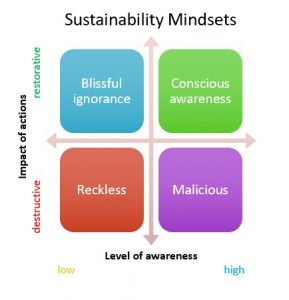
Four sustainability ‘mindsets’ have been identified and the challenge is how to move society towards the top right quadrant of conscious awareness. Research is urgently required on understanding what will work and what are the barriers to change. Researchers will need to work closely with practitioners and businesses to experiment and evaluate alternatives, and they urgently need to do so.
For further information, or to discuss how these models can be used, please contact Dr Karen Thompson, Dr Nigel Williams or Professor Janet Dickinson, all from Faculty of Management.
Can sustainability be taught?
At the FoM ‘Sustainability Symposium’ yesterday, we explored what sustainability means for teaching and learning.
Sustainability is high on the list of priorities for BU, with KPIs for aligning all courses and research with one or more of the UN’s 17 Sustainable Development Goals and the launch of a Strategic Investent Area for ‘Sustainability, Low-Carbon Technology and Material Science’ last week. Yesterday an audience of academics, students, professional services colleagues and external practitioners came together to better understand the crises facing humanity today.

Gwyn Jones, Director of Association of Sustainability Practitioners, argued for sustainability to be viewed as the outcome of conscious thinking. Accordingly, sustainability is experienced and practised rather than learnt in a classroom and is enacted as a mindset.
Four mindsets have been identified and our challenge is to move society and our learners towards the top right quadrant of conscious awareness.
The question we asked was ‘What does extinction mean for business?’ It became clear that the question is relevant not only to the Business School, but for all disciplines at BU as indicated by a comment from one participant “I found it really interesting and frankly rather scary (and I’m informed) … I’m keen to try to do something similar [in my Faculty] and be active in this agenda more broadly” (FC).
Most models of business are based on assumptions that value profit and growth above all else. Many of these models were developed during the industrial revolution and are now contributing to the destruction of our environment and society. According to Gwyn, those who claim to have answers to sustainability, don’t understand the problem.
We discussed new business models and case studies that are based on understandings of purpose and decision-making that balances competing priorities. One student who was with us for the day commented “I am very excited to interact with all the bright minds in the room discussing sustainability … it was a great day for me” (Sacha, MBA student).
So, what does this mean for programmes and pedagogy? We can no longer rely solely on text books because we are only just starting to uncover the questions we need to ask. Understanding how we can live sustainably with ‘enough for everyone, forever’ has not been addressed before and we do not have answers yet. We need to be comfortable asking difficult questions and seeking answers in novel ways. Social learning is one approach being used to develop new concepts. Dr Karen Thompson and Dr Nigel Williams have been collaborating with practitioners to ask novel questions and develop new resources for education, research and practice of Responsible Project Management.

An argument made by Karen is that sustainability should not be seen as an ‘add on’ to the curriculum, rather it should be used as a lens through which we view all aspects of our discipline.
Experiential learning will be important for developing a sustainability mindset among learners. ‘Living Labs’ are recognised in BU2025 and can be expected to play a useful role for both education and research in the future. We need to develop learners’ sense of agency and confidence that they can make a difference in the world. Virtual reality may have a role to play in developing the capabilities for managing more responsibly. Lastly, we need to encourage our graduates to become advocates for better decision-making in the organisations they will work in.
For further information, or for advice about running your own sustainability event, please contact Dr Karen Thompson or Professor Janet Dickinson, both from Faculty of Management.
Sustainability Symposium
The Faculty of Management held a “Sustainability Symposium” yesterday as one response to the challenges facing businesses today. Organised by Dr Karen Thompson in collaboration with Professor Janet Dickinson and Gwyn Jones, a Director of the Association of Sustainability Practitioners, the event brought together over 50 participants, including academics from a range of disciplines, students and external practitioners.
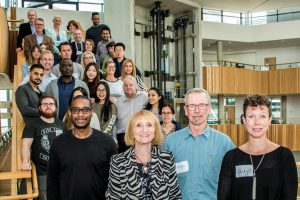
Sustainability is not just about technology, as Professor Janet Dickinson explains:
“The Committee on Climate Change suggest the UK could achieve net zero greenhouse gas emissions by 2050. Technology is expected to produce 38% of the reduction, societal/behavioural change delivering 9% and the remining 53% coming from a combination of both.”
Clearly, social scientists and business experts will need to work with the technologists to develop solutions and change society if we are to achieve this target.
Nor is sustainability just an issue for future generations. The impacts of greenhouse gas emissions are here today and, according to the latest models, we only have a very short window of opportunity before the planet reaches a ‘tipping point’ beyond which we will be unable to reverse progress towards an uninhabitable planet. “Being less unsustainable is not the same as being sustainable” (Hugo Spowers, Founder & CEO of Riversimple).
Sustainability is high on the list of priorities for BU. Our BU2025 vision includes KPIs for all our research and education to be aligned with one or more of the UN’s 17 Sustainable Development Goals, and a new Strategic Investment Area has recently been launched in ‘Sustainability, Low-Carbon Technology and Materials Science’.
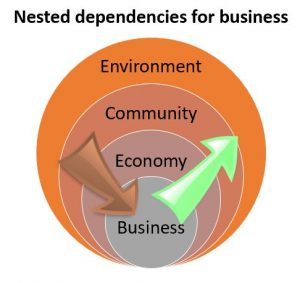
Business is one of the greatest forces on the planet. Emerging research suggests that companies who proclaim their ‘green’ credentials most loudly often perform the worst, not just in terms of the environment but also in terms of profits and shareholder value over the long term. Trading-off between the short term and the long term, or between domains, does not produce sustainability for a business.
One of the questions posed by Gwyn Jones was ‘What are we trying to sustain? He suggested that what we are aiming to sustain is life. And the question we do not yet have an answer to is ‘How can 10 billion people live in harmony and peace, equitably by 2050?’
Seeking answers to this question in a business context involves developing our understandings of the dependencies among profit, people and planet. In other words, every business depends upon a community, and all communities depend on the natural environment.
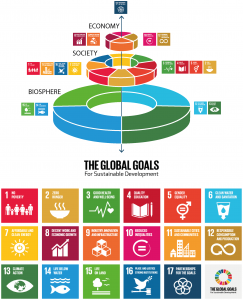
All businesses draw resources from and have impacts, both beneficial and detrimental, on the other domains. Awareness and understanding of these dependencies will be required if we are to make progress. The UN’s 17 Sustainable Development Goals can provide a useful framework for analysing impact and are mapped against the biosphere, society and the economy.
Sustainability has profound implications for both education and research.
We explored the question ‘Can sustainability be taught?’ (see a separate post on this).
Research on sustainability is likely to require one or more of the three characteristics identified during the event:
- Cross-disciplinary thinking that seeks to understand the complexity of social practices
- Fundamental re-thinking of existing models and ways of doing business
- Partnerships with practitioners and stakeholders representing the interests of all domains.
Further thoughts on the implications for research are discussed in a separate post (see ‘Sustainability changes everything’).
For further information please contact Dr Karen Thompson or Professor Janet Dickinson, from Faculty of Management.
Applications Open! Re-commissioning the Research Centres
Following a recent review by the Research Performance Management Committee (RPMC) applications are now open for the establishment of new Research Centres. This process is open to all groups of academic staff, each led by a member of the Professoriate, to put forward proposed Research Centres. Applications can be from established Research Centres, new groupings or new amalgamations of groupings (old and/or new). The new Research Centres will be launched in September when existing Research Centres will cease to exist unless they have applied under this process (except where exempt).*
Research Centres are the public face of BU’s research. They bring together individuals and research teams from across the University to form collaborative and interdisciplinary groupings which, through the development and delivery of world-leading research, strengthen and underpin the delivery of the BU2025 vision. They offer an opportunity for the Professoriate to engage in leadership of research that can contribute significantly to the aims of BU2025 – see leadership role descriptor – and provide a genuine platform for innovation and the achievement of critical mass.
Research Centres provide opportunities for staff at all levels to become members, benefitting from dynamic, creative relationships which cut across the perceived boundaries of discipline, Department and/or Faculty. Research Centres provide members with the opportunity to be a part of an interdisciplinary research community, which enables individuals to join and establish interdisciplinary relationships and networks which can facilitate and strengthen their own research.
The Process
Applications (see pages 6 – 9) are to be completed and submitted to the Faculty Research and Professional Practice Committee (FRPPC) for approval. As part of the application process Research Development and Support (RDS) will provide a data set of the KPI’s relating to the proposed membership for the past year. This means that there are two deadlines – the first being to allow time for the data set to be prepared and the second for final submission to FRPPC. Arrangements and the dates for submission vary between Faculties and are shown in the table below:
| Faculty | D/L for proposed
membership list |
D/L for completed
application to FRPPC |
D/L for approval by Faculty |
| FMC | 5th July 2019
A Faculty meeting on 5th July 2019 will discuss and finalise Research Centre compositions. Proposed Centres and membership lists should be brought to this meeting. |
14th July 2019
Details of submitting completed applications to be decided at this meeting but the deadline is 14th July and will be submitted for FRPPC via DDRPP (ethorsen@bournemouth.ac.uk) |
18th July 2019 |
| FHSS | 14th June 2019
Proposed membership lists to be sent directly to Project Delivery Manager (plynch@bournemouth.ac.uk) by 14th June who will provide data set by 21st June |
5th July 2019
Deadline for submission of completed applications to DDRPP (vhundley@bournemouth.ac.uk) |
21st July 2019 |
| FoM | 28th June 2019
Completed applications (including membership lists) to be sent directly to Project Delivery Manager (plynch@bournemouth.ac.uk) by 28th June 2019. |
28th June 2019
Same as deadline for membership list. Project Delivery Manager will forward to DDRPP (msilk@bournemouth.ac.uk) |
19th July 2019 |
| FST | 21st June 2019, 5 pm
Completed applications (including membership lists) to be sent to DDRPP tzhang@bournemouth.ac.uk |
21st June 2019
Same as deadline for membership list. |
4th July 2019 |
For an overview of the approval process please see this flowchart.
If you have any questions please contact me, (plynch@bournemouth.ac.uk EXT 68265), or the DDRPP for your Faculty.
*Institutes will be exempt from this process and addressed later. The following entities are exempt from this process for the reasons stated: NCPQSW and NCCA as they are externally recognised national centres; DMC, CoPMRE, Centre for GP Practice, Centre for Digital Entertainment and BUCRU as their purpose and remit exceeds the scope of the Research Centres policy and therefore the re-commissioning process











 New weight change BU paper
New weight change BU paper One week to go! | The 16th Annual Postgraduate Research Conference
One week to go! | The 16th Annual Postgraduate Research Conference Geography and Environmental Studies academics – would you like to get more involved in preparing our next REF submission?
Geography and Environmental Studies academics – would you like to get more involved in preparing our next REF submission? Congratulations to three former BU staff
Congratulations to three former BU staff Applications are now open for 2025 ESRC Postdoctoral Fellowships!
Applications are now open for 2025 ESRC Postdoctoral Fellowships! Horizon Europe – ERC CoG and MSCA SE webinars
Horizon Europe – ERC CoG and MSCA SE webinars ERC grants – series of webinars
ERC grants – series of webinars MaGMap: Mass Grave Mapping
MaGMap: Mass Grave Mapping Last reminder – MSCA Postdoctoral Fellowships 2024 internal deadline next week
Last reminder – MSCA Postdoctoral Fellowships 2024 internal deadline next week